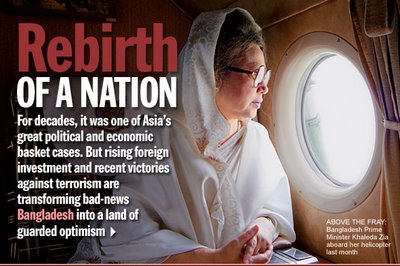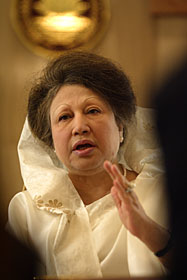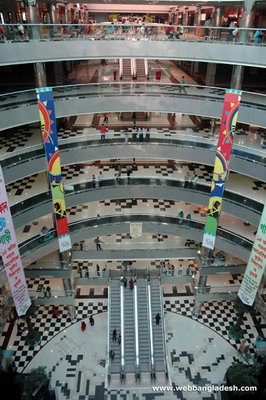Bangladesh: Rebirth of a Nation
 Times reports on the rising of a new Bangaldesh. Just what Bangaldesh needed - a rebirth and that's exactly what's happening. A dedicated new generation driven for success and global recognition has made the dream come true. Bangladesh moves on leaving behind numerous daily propagandas by the new traitors and fighting against a hostile neighbour on a daily basis.
Times reports on the rising of a new Bangaldesh. Just what Bangaldesh needed - a rebirth and that's exactly what's happening. A dedicated new generation driven for success and global recognition has made the dream come true. Bangladesh moves on leaving behind numerous daily propagandas by the new traitors and fighting against a hostile neighbour on a daily basis.Rebuilding Bangladesh
A nation long plagued by natural disasters, poverty, corruption and violence may finally be on the verge of a happier future - by Alex Perry
As Lutfozzaman Babar, Bangladesh's Home Minister, tells it, the call he'd been awaiting for months came at 3 a.m. on March 6 while he was grabbing some sleep in a Singapore hotel during a whistle-stop tour of Asia. "It's him, it's Bangla Bhai," came the voice of a commander in the Rapid Action Battalion (R.A.B.), Bangladesh's élite antiterror squad. "He's surrounded." Babar, the leader of a government drive to rein in Islamic militancy, was instantly awake. "Don't shoot! Don't shoot!" he urged. "We need him alive. We need to know what he knows."
Bhai, whose real name is Siddiqul Islam, was the prime target in the government's crackdown on terrorism...Babar put in a triumphant call to the secure red phone in Prime Minister Khaleda Zia's office. "She was very excited," he recalls. She still is. In an interview with TIME, Zia purrs over how the war against radical Islamists is going. "We've broken their back," she says. "We will catch all of them. They'll get life sentences, or death."
Zia's most popular initiative has been forming the R.A.B., a police force th
 at draws support in part for its willingness to kill....Zia made combating the insurgency the defining mission for Home Minister Babar and the R.A.B., formed in 2004 from 9,000 top officers in the military and police. The Bangladeshi authorities solicited forensic help from the FBI and Scotland Yard, which was particularly interested in a May 2004 bomb attack that injured British High Commissioner Anwar Chowdhury; the R.A.B. also exchanged information with Interpol and Western intelligence agencies. Meanwhile, Zia demanded, and received, public support for an antiterror drive from Bangladesh's religious leaders and from her Islamist coalition members. The government also targeted bank accounts operated by suspect Islamic foundations in order to cut off funding to terrorists.
at draws support in part for its willingness to kill....Zia made combating the insurgency the defining mission for Home Minister Babar and the R.A.B., formed in 2004 from 9,000 top officers in the military and police. The Bangladeshi authorities solicited forensic help from the FBI and Scotland Yard, which was particularly interested in a May 2004 bomb attack that injured British High Commissioner Anwar Chowdhury; the R.A.B. also exchanged information with Interpol and Western intelligence agencies. Meanwhile, Zia demanded, and received, public support for an antiterror drive from Bangladesh's religious leaders and from her Islamist coalition members. The government also targeted bank accounts operated by suspect Islamic foundations in order to cut off funding to terrorists.In addition to Bhai's capture, this antiterrorism campaign has led to nearly 1,000 arrests over the past eight months. Five of the seven top leaders of one terror group, the Jama'atul Mujahideen Bangladesh, have been caught, including Bhai's alleged co-conspirator Sheikh Abdur Rahman. Only two months ago, says a Western diplomat, "I was telling people back home it was just a matter of time before we had the first car bomb or first attack on a foreigner." The "nightmare scenario that could have unhinged the entire country," he adds, was for terrorist attacks to escalate during what is already expected to be a tense general election in early 2007—but that now seems "pretty remote. What we're seeing looks like the implosion of the entire [militant] organization."
Bangladesh, dubbed in the 1970s by Henry Kissinger as a "bottomless basket," is making surprising progress on other fronts, too. According to the U.N.D.P., the country now scores higher than neighbor India on several key barometers of social development, such as infant mortality, child vaccination, and employment of women—a striking turnaround over the past decade or so. The country's much-praised microcredit scheme, operated by the Grameen Bank, has lent an average of $120 each to 5.8 million people. And the government says 100% of young children are now enrolled in primary school, and that girls at last have equal access to education—goals that Zia, as a woman leading a conservative Muslim nation, had made a priority. "If we want to progress as a country, to remove poverty and spread awareness of family planning, we have to give [girls] equal rights," she explains.
 The economy is looking up, too. GDP has grown by at least 5% for three years running, and the Asian Development Bank predicts that growth will hit 6.5% in 2006. Foreign direct investment rose from $138 million to $454 million in the first six months of last year compared to the same period the previous year. The number of cell-phone users rose by 144% in a year. And Goldman Sachs has rated Bangladesh as one of 11 developing nations that, in the long term, could emulate the success of China, India, Brazil and Russia. Mahmudur Rahman, Zia's executive chairman of the Government Board of Investment, can scarcely hide his delight, describing Bangladesh's recent economic success as "nothing short of a miracle."
The economy is looking up, too. GDP has grown by at least 5% for three years running, and the Asian Development Bank predicts that growth will hit 6.5% in 2006. Foreign direct investment rose from $138 million to $454 million in the first six months of last year compared to the same period the previous year. The number of cell-phone users rose by 144% in a year. And Goldman Sachs has rated Bangladesh as one of 11 developing nations that, in the long term, could emulate the success of China, India, Brazil and Russia. Mahmudur Rahman, Zia's executive chairman of the Government Board of Investment, can scarcely hide his delight, describing Bangladesh's recent economic success as "nothing short of a miracle."That might be overstating it. But Christine Wallich, World Bank country head, says that in the past 12-18 months international opinion has indeed gone through a sea change. Bangladesh, she says, is now seen as "the little engine that could." Dramatic proof of that comes in plans by India's biggest business group, Tata, for a $2.5 billion investment in Bangladesh in steel, gas, coal and power. If it proceeds as planned, that would exceed the total foreign direct investment the country has attracted since independence. Wallich says the effect on Bangladesh of such a vote of confidence would be "transformative."
Salim Chaklader, 45, is part of the rising tide of Bangladeshis who have escaped from subsistence living and joined the happier ranks of the urban middle class. Born in a village outside Dhaka, he and his family moved to the capital in 1973 and set up a shop importing cloth from Thailand and China. The family now has six shops and 40 employees, and Chaklader hopes to send his two sons, 18 and 16, to university. "We're pretty confident of the future," he says. His conviction is echoed by Alan Rosling, executive director of Tata Sons and a prime mover behind Tata's investment in Bangladesh. "There is poverty," he says, "but there's also a fast-developing middle class, which makes it an attractive market. People tell us we're taking a big risk. But we've had a long, hard look at Bangladesh and while, yes, there are issues, there's nothing we see there that we don't see in most countries."
.....what was once one of the sorriest places on earth, there is new hope. From the slow but marked gains in foreign investment to Zia's decision to fight Islamic militancy head-on, Bangladesh has achieved progress that few outsiders, or even Bangladeshis, believed possible a few years ago. "All we need," says University of Dhaka Professor of Economics Abul Barkat, "is five years of good governance, and we'd be away." Surely no nation ever deserved it more.







2 Comments:
very inspiring...
i feel like going back...
I was wondering, why is our country run by a lady? Isn't that unIslamic for some reasons?
Post a Comment
<< Home